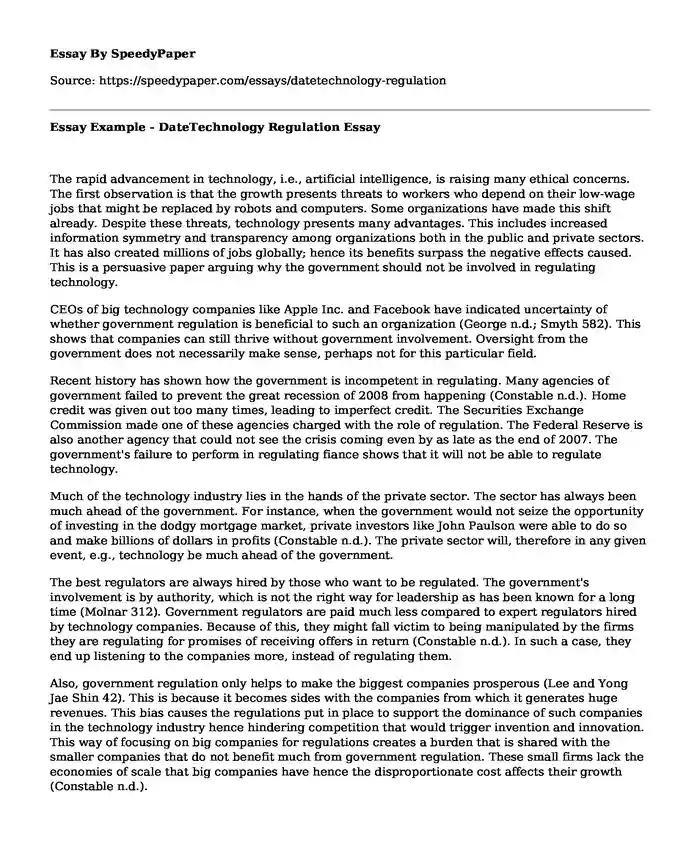
| Type of paper: | Argumentative essay |
| Categories: | Government Ethical dilemma Artificial intelligence Social issue Essays by pagecount |
| Pages: | 3 |
| Wordcount: | 717 words |
The rapid advancement in technology, i.e., artificial intelligence, is raising many ethical concerns. The first observation is that the growth presents threats to workers who depend on their low-wage jobs that might be replaced by robots and computers. Some organizations have made this shift already. Despite these threats, technology presents many advantages. This includes increased information symmetry and transparency among organizations both in the public and private sectors. It has also created millions of jobs globally; hence its benefits surpass the negative effects caused. This is a persuasive paper arguing why the government should not be involved in regulating technology.
CEOs of big technology companies like Apple Inc. and Facebook have indicated uncertainty of whether government regulation is beneficial to such an organization (George n.d.; Smyth 582). This shows that companies can still thrive without government involvement. Oversight from the government does not necessarily make sense, perhaps not for this particular field.
Recent history has shown how the government is incompetent in regulating. Many agencies of government failed to prevent the great recession of 2008 from happening (Constable n.d.). Home credit was given out too many times, leading to imperfect credit. The Securities Exchange Commission made one of these agencies charged with the role of regulation. The Federal Reserve is also another agency that could not see the crisis coming even by as late as the end of 2007. The government's failure to perform in regulating fiance shows that it will not be able to regulate technology.
Much of the technology industry lies in the hands of the private sector. The sector has always been much ahead of the government. For instance, when the government would not seize the opportunity of investing in the dodgy mortgage market, private investors like John Paulson were able to do so and make billions of dollars in profits (Constable n.d.). The private sector will, therefore in any given event, e.g., technology be much ahead of the government.
The best regulators are always hired by those who want to be regulated. The government's involvement is by authority, which is not the right way for leadership as has been known for a long time (Molnar 312). Government regulators are paid much less compared to expert regulators hired by technology companies. Because of this, they might fall victim to being manipulated by the firms they are regulating for promises of receiving offers in return (Constable n.d.). In such a case, they end up listening to the companies more, instead of regulating them.
Also, government regulation only helps to make the biggest companies prosperous (Lee and Yong Jae Shin 42). This is because it becomes sides with the companies from which it generates huge revenues. This bias causes the regulations put in place to support the dominance of such companies in the technology industry hence hindering competition that would trigger invention and innovation. This way of focusing on big companies for regulations creates a burden that is shared with the smaller companies that do not benefit much from government regulation. These small firms lack the economies of scale that big companies have hence the disproportionate cost affects their growth (Constable n.d.).
In conclusion, government oversight over technology companies does not help advance technology. Instead, it helps big companies to grow, creating bias by disproportionately laying the cost of regulation on smaller firms. Also, the government has been incompetent in other industries. This guarantees that indeed it will not succeed in regulating the technology industry.
Works Cited
Constable, Simon. "Why We Should Not Regulate The Tech Industry". Forbes, 2018, Accessed through https://www.forbes.com/sites/simonconstable/2018/03/26/no-we-really-dont-need-government-regulation-of-the-tech-industry/#14bbdacdeb8d.
George, William W., and Amram Migdal. "Facebook Confronts a Crisis of Trust." (2018).
Lee, In, and Yong Jae Shin. "Fintech: Ecosystem, business models, investment decisions, and challenges." Business Horizons 61.1 (2018): 35-46. Accessed through http://www.academia.edu/download/60183957/BH865-PDF-ENG__Fintech__Ecosystem__business_models_20190801-95998-19ksrtq.pdf
Molnar, Petra. "Technology on the margins: AI and global migration management from a human rights perspective." Cambridge International Law Journal 8.2 (2019): 305-330. Accessed through http://www.academia.edu/download/61830849/CILJ_2019-Technology_on_the_Margins20200119-116861-1awjylr.pdf
Smyth, Sara M. "The Facebook Conundrum: Is it Time to Usher in a New Era of Regulation for Big Tech?" International Journal of Cyber Criminology 13.2 (2019).
Teo, Yi-Ling. "Regulating Artificial Intelligence: An Ethical Approach." (2018).
Cite this page
Essay Example - DateTechnology Regulation. (2023, May 01). Retrieved from https://speedypaper.net/essays/datetechnology-regulation
Request Removal
If you are the original author of this essay and no longer wish to have it published on the SpeedyPaper website, please click below to request its removal:
- Free Essay on The Sparrow Book
- Am I Dreaming - Personal Experience Essay Sample
- Essay Example Discussing Access to Healthy Foods in Urban Communities
- Disappointing Experience Essay: Features and Specifications of the Paper
- Free Essay for You: Human Population and the Demographic Transition Model
- Essay Sample: Food Truck Business Plan
- Free Essay: Benefits and Challenges of Having One Channel Partner in the Example of Martin Guitar
Popular categories




